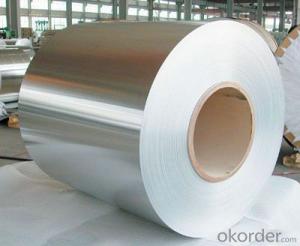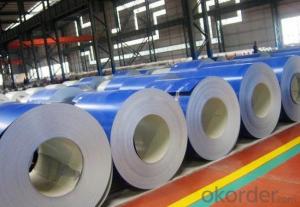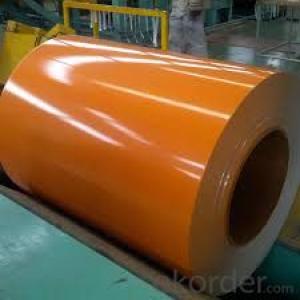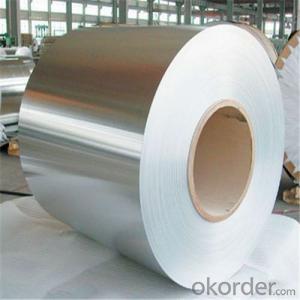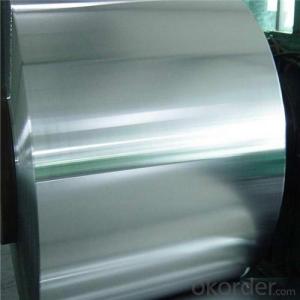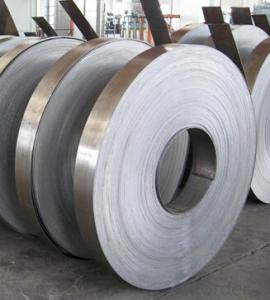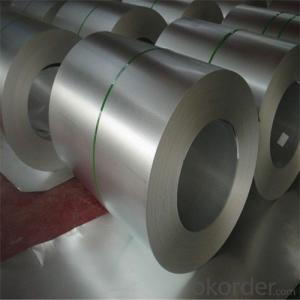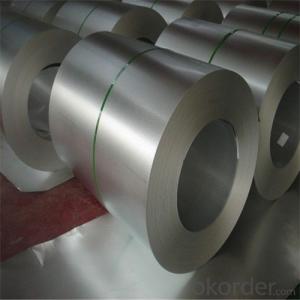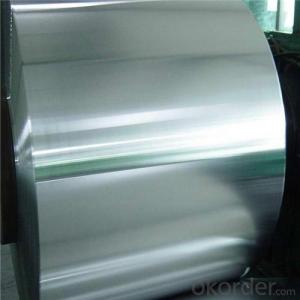Hot-Dip Aluzinc Steel Coil Used for Industry with Our Best High Quality
- Loading Port:
- Tianjin
- Payment Terms:
- TT OR LC
- Min Order Qty:
- 25 m.t.
- Supply Capability:
- 8000 m.t./month
OKorder Service Pledge
OKorder Financial Service
You Might Also Like
Hot-Dip Aluzinc Steel Coil Used for Industry
1.Structure of Hot-Dip Aluzinc Steel Coil Description
Hot-dip aluzinc steel sheet is substrated on cold rolled steel in various strength and specification. Coating composition is 55% aluminmum in weight ratio, 43.4% zinc, and 1.5% silicon, with excellent and heat resistance performance.
2.Main Features of the Hot-Dip Aluzinc Steel Coil
•High Purity
•Easy control and operation
•High strength
•Fast melting
•Competitive price
•Best Service
3. Hot-Dip Aluzinc Steel Coil Images
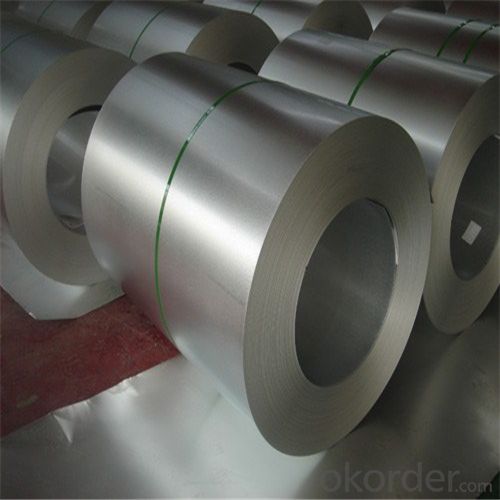
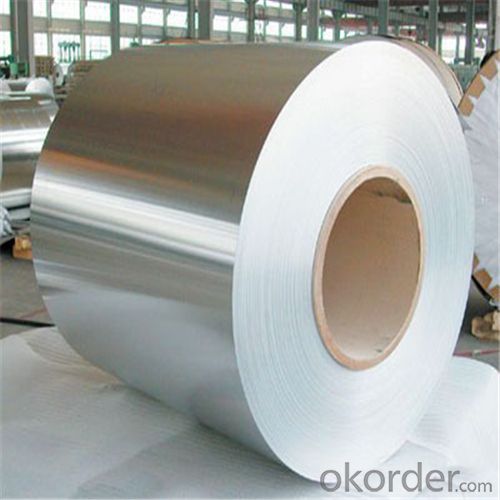
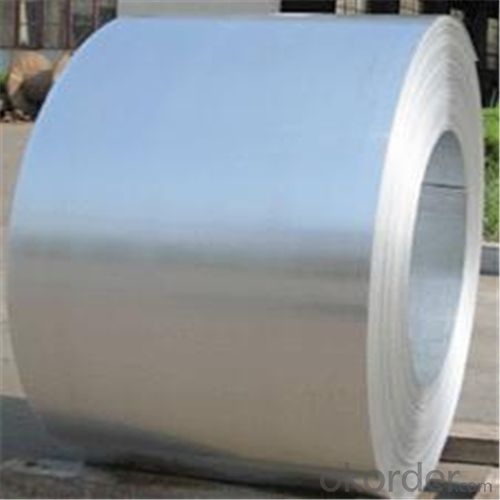
4. Hot-Dip Aluzinc Steel Coil Specification
Hot-Dip Aluzinc Steel Coil | |
Thicknenss | 0.16mm-3.5mm |
Width | 1250mm max |
Coating mass | 30-185g/㎡ |
Spangle | Regular/Minimized/Zero Spangle |
Coil inner diameter | 508-610mm |
Surface treatment | Chromated/non chromated, Oiled/non oiled, Anti finger print |
5.FAQ of Hot-Dip Aluzinc Steel Coil
We have organized several common questions for our clients,may help you sincerely:
①
How to guarantee the quality of the products?
We resolutely put an end to unqualified products flowing into the market. At the same time, we will provide necessary follow-up service assurance.
With excellent cold bending molded manufacturablity, good decoration effect, strong anti-corrosion ability, galvanized steel coils and sheets are also pollution-free and easily recycled.
②
How long can we receive the product after purchase?
In the purchase of product within three working days, We will arrange the factory delivery as soon as possible. The pecific time of receiving is related to the state and position of customers.Commonly 7 to 10 working days can be served.
③
How about your company?
A world class manufacturer & supplier of castings forging in carbon steel and alloy steel,is one of the large-scale professional investment casting production bases in China,consisting of both casting foundry forging and machining factory.
- Q: What are the quality control measures for steel coils?
- Quality control measures for steel coils typically include various inspections and tests to ensure that the coils meet the required standards and specifications. These measures often involve visual inspections to identify any surface defects or irregularities, such as cracks, dents, or scratches. Additionally, dimensional checks are performed to verify the coil's size, shape, and weight. Other quality control measures may involve conducting mechanical tests, such as tensile strength and hardness tests, to assess the strength and durability of the steel coils. Overall, these measures aim to guarantee that the steel coils are of high quality and suitable for their intended applications.
- Q: How are steel coils used in the manufacturing of telecommunications equipment?
- Steel coils are used in the manufacturing of telecommunications equipment as they are commonly used as a raw material for various components, such as enclosures, cabinets, and brackets. The coils are processed and shaped to create the necessary parts that provide structural support, protection, and stability to the telecommunications equipment.
- Q: I'm looking for the weight of different types of steel and haven't found anything helpful!!thank you
- of course you couldn't find it, the weigh depends on the size of the piece. What you are looking for, I think, is density. Below are a few tables, there are lots more. .
- Q: can steel boil and turn into a gaseous state?? if so how hot does it have to be for it to boil
- The amount of heat needed can be generated. The heat on the surface of the sun is sufficient. Steel will break down before it gets that hot. The carbon in the steel will oxidize into carbon dioxide, or vaporize into carbon gas. The outer core of the Earth is composed of molten iron and nickel. Its also done in steel plants every day.
- Q: What are the different types of steel coil transport methods?
- There are several different types of steel coil transport methods, including flatbed trucks, specialized coil trailers, rail transport, and shipping containers.
- Q: How are steel coils used in the production of containers?
- Steel coils are used in the production of containers as they are the primary material for manufacturing container bodies. These coils are shaped and welded into the desired container shape, providing strength and durability to the final product.
- Q: How do steel coils contribute to the automotive aftermarket?
- Steel coils play a crucial role in the automotive aftermarket by providing the necessary raw material for manufacturing various automotive parts and components. The automotive aftermarket refers to the secondary market for vehicle parts, accessories, and services that are utilized after the original sale of the vehicle. Steel coils are used in the production of several automotive aftermarket products such as springs, suspension components, chassis parts, and body panels. These coils are typically made from high-quality steel alloys that offer the desired strength, durability, and performance characteristics required for these applications. One of the primary applications of steel coils in the automotive aftermarket is in the manufacturing of springs. Coiled springs are used in various automotive systems, including suspension systems, brakes, and clutch systems. These springs provide the necessary support, stability, and shock absorption required for smooth and safe vehicle operation. Additionally, steel coils are used in the production of chassis parts, which are important for maintaining the structural integrity and safety of the vehicle. Chassis parts made from steel coils include frame components, cross members, and reinforcement panels, which contribute to the overall stability and durability of the vehicle. Furthermore, steel coils are utilized in the production of body panels, such as doors, hoods, fenders, and roofs, which are commonly replaced or customized in the automotive aftermarket. These body panels made from steel coils not only provide aesthetic appeal but also offer protection and impact resistance. Overall, steel coils are a critical component in the automotive aftermarket as they enable the production of various parts and components that are necessary for vehicle repair, customization, and enhancement. The high strength, durability, and versatility of steel coils make them an essential raw material for meeting the demanding requirements of the automotive industry.
- Q: I'm going to see Man Of Steel this weekend, and the reviews that I've been hearing aren't that good. I've been hearing that it's this depressing, dark, dramatic film with no humor, loud noises, and action on top of action (which is kind of what I expected from this movie). With that said, I was quite positive that this was what the fans wanted, a more serious Super Man interpretation. I'm ultimately going to judge the movie when I see it, but for now, I have 3 short questions for you:1) What did you think of Man Of Steel?2) Superman Returns got somewhat better reviews than Man Of Steel. Does it seem logical?3) There is a huge fan battle between Man Of Steel and Christopher Reeve's version of Super Man. Which one do you favor?
- saw it yesterday and it was great. all the complaints about it being gloomy...nonsense really. how would u feel if u found out ur life was a big question mark THEN u grow up only to get tossed in giant sh*t storm. many right now are excluding this is a story driven movie/character. u can't go in expecting anything with this movie especially ANY comparison to precious films. between Reeves and Cavill... I'm not gonna make that decision yet. this portrayal was one of a complete serious nature. u only get a couple glimpses of other emotions. the ending was a great lead off in which the sequel will showcase a lot more emotion within the character guaranteed. for now Reeves is still the best. until we all see Cavill display a full form of charm and charisma then the entire debate is really pointless
- Q: What is the role of steel coils in the production of conveyors?
- The role of steel coils in the production of conveyors is to provide structural support and strength to the conveyor system. Steel coils are used to create the framework and components of the conveyor, ensuring durability and reliability in moving heavy loads. They are the backbone of the conveyor, allowing it to handle various materials and withstand the stresses of continuous operation.
- Q: How are steel coils used in the production of elevator components?
- Steel coils are an essential component in the production of elevator components. These coils are made from high-quality steel that is specifically designed to meet the demanding requirements of elevator manufacturing. One of the primary uses of steel coils in elevator production is for the manufacturing of elevator doors. The coils are processed into flat sheets and then cut into the desired dimensions to create the doors. These doors require strength and durability to withstand frequent use and ensure passenger safety. Steel coils provide the necessary structural integrity and resistance to deformation that is necessary for elevator doors. Additionally, steel coils are also used in the manufacturing of elevator cabins. The coils are processed and formed into various shapes to create the walls and flooring of the elevator cabins. The strength and rigidity of steel make it an ideal material for this purpose, as it can withstand heavy loads and provide a secure and stable environment for passengers. Moreover, steel coils are used in the production of elevator shafts. The coils are rolled into cylindrical shapes and welded together to create the structural framework of the elevator shafts. These shafts need to be strong and rigid to support the weight of the elevator and ensure smooth and safe vertical movement. Steel coils provide the necessary strength, stability, and load-bearing capacity for this critical component of elevator systems. In summary, steel coils are vital in the production of elevator components such as doors, cabins, and shafts. Their strength, durability, and versatility make them suitable for creating reliable and safe elevator systems that can transport passengers efficiently and securely.
Send your message to us
Hot-Dip Aluzinc Steel Coil Used for Industry with Our Best High Quality
- Loading Port:
- Tianjin
- Payment Terms:
- TT OR LC
- Min Order Qty:
- 25 m.t.
- Supply Capability:
- 8000 m.t./month
OKorder Service Pledge
OKorder Financial Service
Similar products
Hot products
Hot Searches
Related keywords
